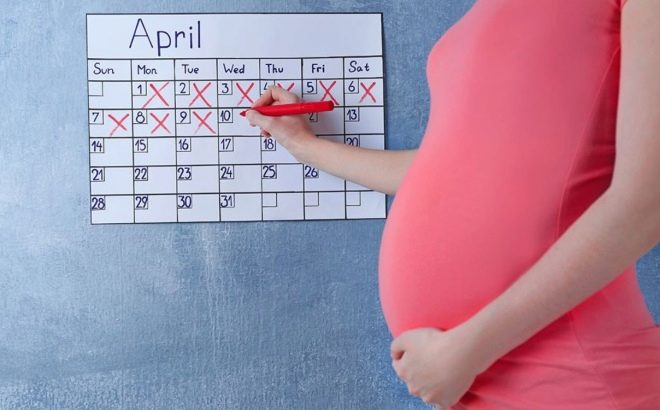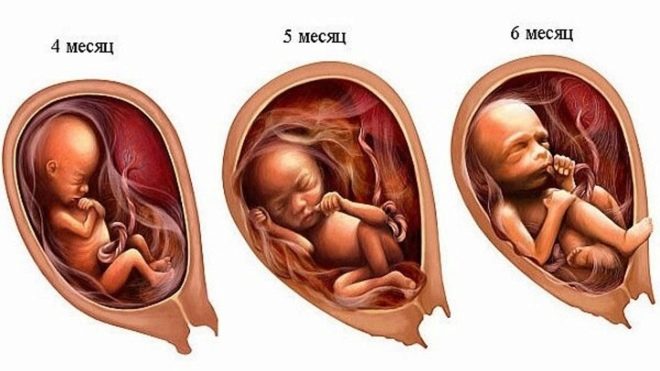What week of pregnancy does the 2nd trimester begin, how long does it last and when does it end?
Pregnancy is divided into three trimesters - each is equal to three months, and only the last - the third, can be more or less long, because it does not end with a specific week, but with childbirth. Each of the trimesters has its own characteristics, and the second is considered to be the most favorable period.
Timing and counting methods
Measuring pregnancy by trimesters began only in the last century, this was done to make it easier for both women and doctors to navigate in the term of gestation. Correctly calculate the term and determine the duration of the trimester will help understanding the difference between obstetric months and calendar.
Women used to rely on the calendar - in one month it can be from 28 to 31 days. BUT obstetricians calculate everything according to their method, and in each month exactly 28 days, not more.
The gestation period, according to the calendar, lasts just over 9 months, and in obstetric terms - 10 months, that is, exactly 40 weeks.
The beginning of pregnancy - the very first day of menstruation, which began the cycle. Conception occurs, it turns out, only in 2 weeks of pregnancy, and tests begin to become "striped" only by the end of 4 weeks. Knowing this, there will be no confusion in the timing.
The 2nd trimester starts from the 14th week of pregnancy and lasts for three months (4-6 months inclusive). This period ends in 26 weeks and several days.. For this reason, the information on the dates of termination of the trimester is rather contradictory: even the doctors themselves cannot come to a common opinion on what is considered to be the end of 26 or 27 weeks, because the actual period is in the middle of this period. Therefore, any woman can be considered as more like her.
Indisputably one - 2 trimester ends 26-27 obstetric week. 27 full weeks is the beginning of the third trimester.
Special features
The second trimester is the period of systemogenesis, when all the organs and systems of the baby already formed earlier begin to debug functioning and interaction. At the same time, the fetus is actively growing, the mineralization of its bones, which are still quite soft at the beginning of the second trimester, as well as the development of its central nervous system.
- 20 week the middle of pregnancy falls out, and also from this period some women begin to feel training fights. The first movements of the fetus of a woman are also felt in the second trimester, and for primiparas this period is usually 20-22 weeks, and for multiparous ones - 18-20 weeks.
- From 22 weeks pregnancy, the child enters the perinatal period, and if he is born at a given time, then this event will be qualified not as a miscarriage, but as a birth, of course, occurring prematurely, that is, premature. But the chances of surviving the baby will still be.
- From 24 weeks ripening of lung tissue begins. In the middle of his prenatal life, the baby begins to dream, hear, train numerous reflexes and increase weight. The fetus is not yet large, so that the pregnancy is burdensome for a woman, it is well protected by the placenta.
This trimester is considered the easiest and safest for both mother and child. With the onset of this period, toxicosis disappears, the state of health improves markedly.
It is only important to ensure that you do not gain weight, as well as to note the nature of the discharge and the presence of edema.
Influenza and acute respiratory viral infections are no longer so dangerous for the crumbs, because everything is shaped, but nevertheless infections should be avoided, since the mother’s diseases can negatively affect the state of uteroplacental blood flow.
Recommendations for women
The simple recommendations will help you safely pass the second trimester of pregnancy:
exclude the use of coffee, alcohol, strong black tea, do not smoke and do not use drugs - they will adversely affect the state of the placenta, which can lead to hypoxia, fetal fetal death, delay in its development, and can also disrupt the functioning of the newly formed fetal organs;
watch for secretions - their number, color, smell and texture will help to mark the habit of using sanitary pads (use of tampons for pregnant women is prohibited);
use a rich cream or special products for the skin of the mammary glands and abdomen, to prevent strong stretch marks, get ready for breastfeeding - wear a supporting bra with wide straps and wipe your breasts with a stiff towel to nipple “workout”;
try to get enough sleep, if necessary and possible, make an hourly day “quiet hour”;
change regular clothes to loose special clothes for expectant mothers - the stomach should not be pulled, and natural fabrics should help in questions of sweating, which is often found in the middle of the term of carrying a child;
can be purchased and start using prenatal bandage;
second trimester - great time to buy baby "dowry";
eat well, in small portions up to five times a day, make sure that constipation does not occur;
weigh yourself weekly and mark the increase;
be sure to visit the doctor in the antenatal clinic at the appointed time, undergo tests and take tests. This will help the doctor and future mother to better understand how the pregnancy proceeds, how the baby feels.










